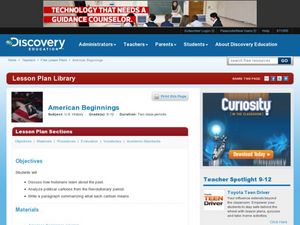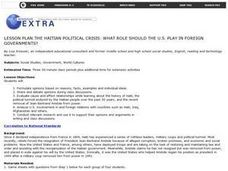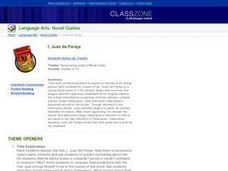Curated OER
American Beginnings
Eleventh graders examine the role of historians. In this American History lesson plan, 11th graders analyze document based questions. Students write a summary of these documents.
Curated OER
The Embodied Presidency
Eighth graders discover details about Thomas Jefferson's life. In this early American history instructional activity, 8th graders view a PowerPoint presentation that outlines some aspects of Jefferson's life. Students research the life...
Curated OER
Find the Flag
Students explore the flag. In this social studies lesson, students search for flags in a picture. When students locate a flag, they will read a fact about the flag, how to display it and how to care for the flag.
Curated OER
Let Freedom Ring
Students go to the computer lab to engage in this thoughtful lesson on our national symbols. Students access the internet, and solve an on-line puzzle of a national symbol of freedom. The symbols are the Eagle, The Statue of Liberty, The...
Curated OER
Teaching Grammar in Context: Using Sentence Combining to Teach Subordination
Reinforce sentence styles with this lesson, which prompts young grammarians to build complex and compound-complex sentence structures. They respond to non-print text and identify subordinators as parts of speech procedure. They spell...
Curated OER
Obstacles to Perseverance
What does it mean to persevere. Young historians review the definition of perseverance then brainstorm a list of obstacles colonists and revolutionaries had to overcome during the American Revolution. Using this list, they identify...
Curated OER
The Supreme Court: The Judicial Power of the United States
Students learn basic facts about the Supreme Court by examining the United States Constitution and one of the landmark cases decided by that court.
Curated OER
Simulation: Revolutionary Town Hall Meeting
Secondary historians simulate events leading up to the American Revolution. They assume the roles of patriots, loyalists, or neutrals in a town meeting set prior to the Revolution. As Patriots and Loyalists make their arguments, neutrals...
Curated OER
Colonialism/The Arab/Israeli Conflict
Investigate critical historical issues using primary source documents then gather and evaluate information regarding the Jewish and Arab claims to land in Israel. Learners use their findings to prepare detailed timelines of events during...
Curated OER
Manifest Destiny and Westward Expansion
Students explore the economic, political, racial, and religious roots of Manifest Destiny. They read articles and analyze how the concept influenced the nation's westward expansion. Students discover the motivations and expectations of...
Curated OER
TURNING POINT IN HISTORY:The War of 1812
Students act as investigative reporters and research battles or events of the War of 1812. They write an original article, which may include a map, drawing, or illustration.
Curated OER
The Haitian Political Crisis: What Role Should the U.S. Play in Foreign Governments?
Students examine the political situation in Haiti. They share their opinions on the role the United States should play in foreign governments. They identify the causes of the turmoil in the country as well.
Curated OER
Taking Up Arms and the Challenge of Slavery in the Revolutionary Era
Students examine a series of documents which discuss the contradiction in the Americans' rhetoric about slavery. They act as members of designated Committees of Correspondence in the five different colonies, communicating their...
National Endowment for the Humanities
Magna Carta: Cornerstone of the U.S. Constitution
High schoolers use the Internet to read a brief description of Magna Carta (link provided). They "walk through" the document with the teacher, identifying four major themes. High schoolers read and discuss "The Rhetoric of Rights:...
Curated OER
Differing Expectations
Students examine the expectations that colonists had for lives prior to the revolution. In this colonial America lesson, students read primary documents that feature the perceptions of white men and minorities during the time period....
Curated OER
Free Speech or Hate Speech?
Students see the difference between protected and prohibited speech as guaranteed by the First Amendment. They explain why free speech is essential to a democracy and consider how best to deal with speech they find offensive.
Curated OER
I, Juan de Pareja
Students examine a work of historical fiction based on the life of an actual person who modeled for the painter, Diego Velazquez. Elizabethy Borton de Trevirio's story, "I, Juan de Pareja" provides opportuities for the reader to discover...
Curated OER
Recruitment
Fifth graders analyze and then draw recruitment posters. In this Revolutionary War instructional activity, 5th graders analyze recruitment posters and discuss the attitude towards African Americans. Students analyze primary documents...
Curated OER
Yankee Doodle... More than Just a Catchy Tune
Students investigate the history of patriotic music and practice singing the tunes with classmates. In this U.S. History instructional activity, students examine lyrics of the traditional song "Yankee Doodle Dandy" and discuss the...
Curated OER
All Men Are Created Equal
Students evaluate and compare events in history using famous quotes. They create a bulletin board of famous quotes dealing with equality. They create a multimedia presentation using famous quotes on the theme, All Men are Created Equal.
Curated OER
Why is Delaware Called "The First State"?
High schoolers learn why Delaware is called the First State and the background leading to Delaware's ratification of the US Constitution. Students, in groups, choose an individual in today's world that has the greatest influence on their...
Curated OER
The U.S. Constitution: Practical Application of the Amendments
Students create their own HyperStudio cards which include scanned images of at least one member (designated reader) of each group. They add the text of a predetermined amendment. The designated reader then reads the selected amendment.
Curated OER
It's Time to Put Our Money Where Our Mouths Are
Eighth graders choose a person who should be honored on our currency. They write a letter outlining the reasons for their choice.
Curated OER
CIVIL DISOBEDIENCE
Young scholars use events of the time to illustrate the significance of the 1965 Selma-to-Montgomery Voting Rights March.

























